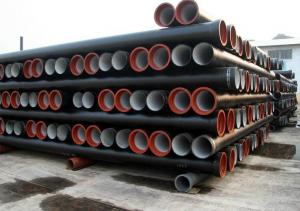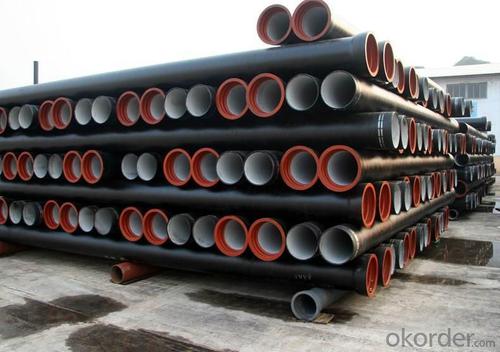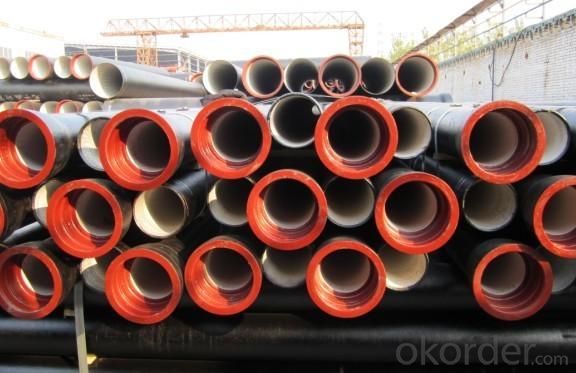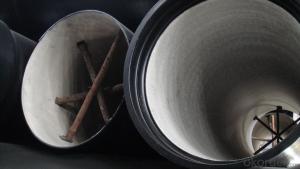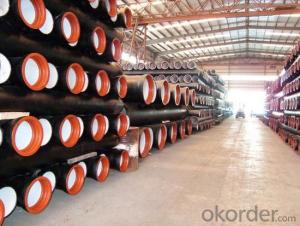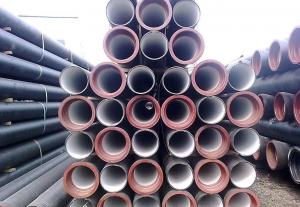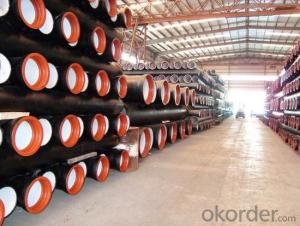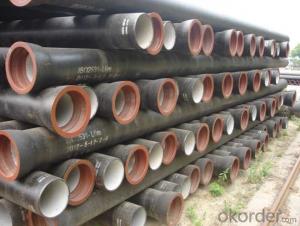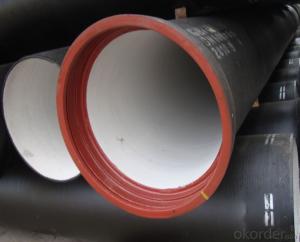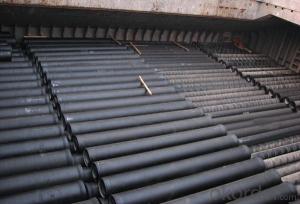Ductile Iron Pipe EN545/EN598 DN500-DN800
- Loading Port:
- China main port
- Payment Terms:
- TT or LC
- Min Order Qty:
- 1000 m.t.
- Supply Capability:
- 200000 m.t./month
OKorder Service Pledge
OKorder Financial Service
You Might Also Like
1.Ductile Iron Pipe Description :
1) Pipes confirm to ISO2531,K9 class,T type joint,6m long,with inside cements lining conform to ISO4179,outside Zinc
spraying(130g/m2) and bitumen coating(70μm) conform to ISO8179.
2) Pipe ends: Spigot and socket ends, with 100% SBR rubber gaskets accoding to ISO4633
3) we can do third party inspection according to customer's request.
2.Main Features of the Ductile Iron Pipe:
1).Quality guarantee
• Chemical checking
• NDE after rough machining
• Mechanical testing after heat treatment
• Final NDE,dimension inspected
2).Packing and Shipping
• standard export package(carton/wooden case/pallet)
• accept FOB,FAS,CNF,CIF door to door etc or customer designated shipping agent
3.Ductile Iron Pipe Images:
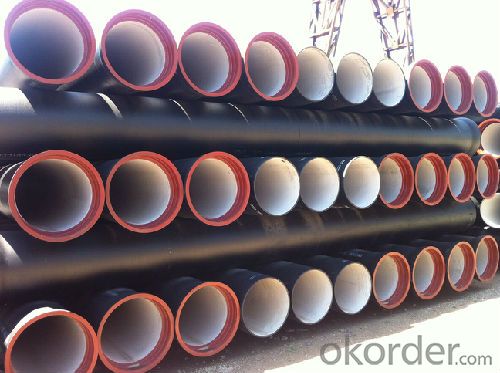
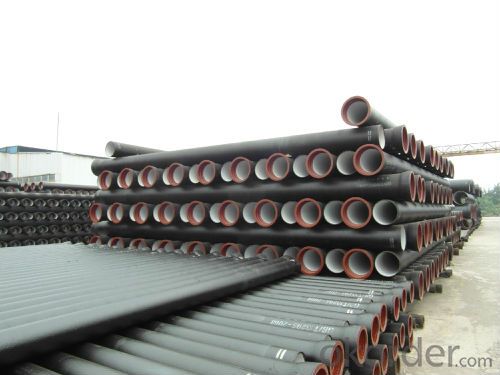
4.Ductile Iron Pipe Specification:
Internal lining: ductile iron pipes shall have an internal cement mortar lining in acc with ISO4179.
External coating: ductile iron pipes shall be externally coated with metallic zinc spray plus a further layer of resin
painting to ISO8179.
Gasket: 100% SBR/NBR/EPDM rubber gasket in accordance with ISO4633.
Packing: ductile iron pipes from DN100 to DN300 be bundled with steel belts, others are in bulk.
Payment term: L/C, T/T.
5.FAQ:
We have organized several common questions for our clients,may help you sincerely:
1.Q: Why would you choose ductile iron pipe rather than other pipe materials?
A:The reasons are obvious for that not only ductile iron pipe possesses the inherent strength and flexibility of ductile
iron, combined with proven corrosion protection systems, but also the cost savings can be achieved from design to
installation and commissioning.
2.Q:Why can you guarantee the inner of pipes can’t be corroded?
A: High alumina cement mortar lining and sulphate-resistant cement mortar lining. These two special linings are applicable
to inner anti-corrosion for sewage pipes, improving resistance to erosion of the sewage components.
- Q: What is the expected noise reduction of ductile iron pipes?
- Several factors can influence the expected noise reduction of ductile iron pipes. These factors include the characteristics of the pipe material and design, the installation method, and the surrounding environment. Generally, ductile iron pipes have been found to offer significant noise reduction compared to other pipe materials. Ductile iron pipes are renowned for their superior acoustic performance, thanks to their dense and robust construction. The material's high density helps absorb and dampen noise vibrations, thus reducing the transmission of sound waves through the pipe. Furthermore, the smooth internal surface of ductile iron pipes minimizes turbulence and friction, contributing further to noise reduction. Numerous studies and field tests have demonstrated that ductile iron pipes can achieve noise reductions ranging from 10 to 20 decibels (dB) or even higher, depending on specific conditions. These noise reductions can greatly enhance the acoustic environment in areas where the pipes are used, such as residential areas, hospitals, or schools. It is important to acknowledge that while ductile iron pipes can provide substantial noise reduction, other factors like pipe connections, fittings, and valves can impact the overall acoustic performance. Proper installation techniques, including the utilization of effective seals and dampers, can further enhance noise reduction. In conclusion, ductile iron pipes are expected to offer significant noise reduction benefits due to their dense construction, smooth internal surface, and efficient installation methods. However, it is crucial to consider the specific requirements of each project and consult professionals to determine the anticipated noise reduction levels based on the particular circumstances.
- Q: The role of chromium in nodular cast iron
- In order to further understand the mechanism of chromium in ductile iron, the application of electronic scanning and other test means, from chrome crystal structure, crystallization, solidification, heat treatment transformation principle, further study on the mechanism of chromium in ductile iron.
- Q: Are ductile iron pipes suitable for installation in areas with high soil compaction?
- Yes, ductile iron pipes are suitable for installation in areas with high soil compaction. Ductile iron pipes have high strength and durability, allowing them to withstand the pressure exerted by compacted soil. They can effectively resist external loads and provide long-term performance, making them a reliable choice for such areas.
- Q: Are ductile iron pipes suitable for road crossings?
- Indeed, road crossings can indeed be suitably accommodated by ductile iron pipes. Given its robustness and durability, ductile iron proves to be exceedingly appropriate for subterranean installations, specifically road crossings. These pipes exhibit remarkable tensile strength, enabling them to endure substantial loads and traffic pressures without succumbing to fractures or breakages. Moreover, ductile iron pipes showcase exceptional resistance to corrosion, guaranteeing their durability even in the harshest of environments. Not to mention, their effortless installation and upkeep render them a dependable option for road crossings.
- Q: Can ductile iron pipes be used for slurry transportation?
- Yes, ductile iron pipes can be used for slurry transportation. Ductile iron pipes are known for their high strength and durability, making them suitable for various applications including slurry transportation. Slurry is a mixture of solid particles and a liquid, which can be abrasive and corrosive. Ductile iron pipes have excellent resistance to abrasion, corrosion, and erosion, making them capable of handling the challenges posed by slurry transportation. Additionally, ductile iron pipes offer a smooth inner surface, reducing friction and improving the flow of slurry. Therefore, ductile iron pipes are a reliable choice for slurry transportation systems in industries such as mining, wastewater treatment, and oil and gas.
- Q: Are there any alternatives to ductile iron pipe for water distribution?
- There are various options available for water distribution besides ductile iron pipe. Some commonly used alternatives include: 1. PVC (Polyvinyl Chloride) Pipe: PVC pipe is frequently chosen for water distribution due to its affordability, durability, and resistance to corrosion. It is lightweight, easy to install, and requires minimal maintenance. 2. HDPE (High-Density Polyethylene) Pipe: HDPE pipe is a flexible and durable choice for water distribution. It is resistant to corrosion, chemicals, and UV rays, making it suitable for both aboveground and underground installations. HDPE pipe is also known for its leak-free joints and long lifespan. 3. PEX (Cross-linked Polyethylene) Pipe: PEX pipe, a flexible plastic pipe, is commonly utilized for water distribution in residential and commercial settings. It is recognized for its ability to withstand freezing, scaling, and corrosion. PEX pipe is easy to install, has fewer joints, and is highly durable. 4. Copper Pipe: Copper pipe has a long history of use in water distribution due to its exceptional resistance to corrosion and extended lifespan. Although it is more expensive than other alternatives, copper pipe is renowned for its reliability and ability to handle high pressure. 5. Steel Pipe: Steel pipe is a robust and durable option for water distribution, particularly in high-pressure scenarios. It can endure extreme temperatures and resist external loads. However, steel pipe is more costly and requires specialized installation techniques. When selecting an alternative to ductile iron pipe for water distribution, it is crucial to consider factors such as cost, durability, corrosion resistance, installation requirements, and specific project needs.
- Q: How does ductile iron pipe compare to PVC pipe in terms of performance and cost?
- Ductile iron pipe and PVC pipe are two commonly used materials for various piping applications, and they have distinct differences in terms of performance and cost. In terms of performance, ductile iron pipe is known for its exceptional strength and durability. It is highly resistant to internal and external pressures, making it suitable for carrying water, sewage, and other fluids under high pressure conditions. Ductile iron pipe also has an excellent resistance to corrosion and can withstand extreme temperature variations. Moreover, it has a longer lifespan, often lasting over 100 years, which makes it a reliable choice for long-term projects. On the other hand, PVC pipe is renowned for its versatility and ease of installation. It is lightweight, making it easier to transport and handle during installation. PVC pipe is also resistant to chemicals, making it suitable for applications where corrosion may be a concern. However, PVC pipe may not be as durable as ductile iron pipe, especially when subjected to external pressure or harsh environmental conditions. It may also be susceptible to cracking or breaking under extreme temperatures. In terms of cost, PVC pipe is generally less expensive than ductile iron pipe. PVC pipe is manufactured using less costly materials and is easier to produce, resulting in lower production costs. Additionally, the lightweight nature of PVC pipe reduces transportation costs and makes installation more efficient. Ductile iron pipe, on the other hand, tends to be more expensive due to the higher costs associated with its manufacturing process and the heavier weight, which requires additional handling and transportation expenses. Ultimately, the choice between ductile iron pipe and PVC pipe depends on the specific requirements of the project. If strength, durability, and longevity are crucial, ductile iron pipe may be the preferred option despite its higher cost. However, for applications that require versatility, ease of installation, and cost-effectiveness, PVC pipe can be a suitable alternative.
- Q: What is the weight of ductile iron pipe compared to other pipe materials?
- Compared to other pipe materials, ductile iron pipe typically carries more weight. The weight of the pipe may differ depending on its size and thickness, yet in general, ductile iron pipe is more compact and has a greater weight per unit length than materials such as PVC, HDPE, or steel. The main reason for this increased weight is the composition of ductile iron pipe, which consists of iron and carbon, rendering it a robust and resilient choice for a range of piping purposes.
- Q: How does ductile iron pipe handle ground movement and settlement?
- Ductile iron pipe is known for its excellent ability to handle ground movement and settlement. Due to its inherent strength and flexibility, it can withstand significant ground shifts without experiencing major damage or failure. One of the key features of ductile iron pipe is its high tensile strength, which allows it to withstand external forces and pressures. This strength enables the pipe to resist the effects of ground movement, such as soil settlement, subsidence, or shifting due to seismic activity. Moreover, ductile iron pipe has inherent flexibility, which allows it to absorb and distribute stress caused by ground movement. The pipe's flexibility helps to minimize the impact of settlement by allowing it to adjust and adapt to changes in the surrounding soil. This characteristic helps prevent the pipe from cracking, breaking, or leaking when the ground shifts or settles. Additionally, ductile iron pipes are often installed with flexible joints, such as push-on or mechanical joints, which further enhance their ability to accommodate ground movement. These joints provide a degree of flexibility and movement, allowing the pipe to adjust to changes in the soil without experiencing stress concentrations or structural failure. Furthermore, ductile iron pipe is highly resistant to corrosion, which is another important factor in its ability to handle ground movement and settlement. Corrosion can weaken pipes and make them more susceptible to damage during ground shifts. However, the corrosion-resistant properties of ductile iron help maintain the pipe's structural integrity and durability, even in challenging soil conditions. In summary, ductile iron pipe is well-suited to handle ground movement and settlement due to its high tensile strength, flexibility, and corrosion resistance. These properties allow the pipe to withstand external forces and adapt to changes in the surrounding soil, minimizing the risk of damage, leaks, or failure.
- Q: Can ductile iron pipes be used for gas distribution networks?
- Yes, ductile iron pipes can be used for gas distribution networks. Ductile iron pipes are known for their strength, durability, and resistance to corrosion, making them a suitable choice for various applications, including gas distribution. These pipes can withstand high-pressure environments and are less likely to crack or break under stress. Additionally, ductile iron pipes have a long lifespan, reducing the need for frequent replacements and maintenance. However, it is important to note that specific regulations and standards must be followed when installing ductile iron pipes for gas distribution, ensuring proper safety measures and compliance with industry guidelines.
Send your message to us
Ductile Iron Pipe EN545/EN598 DN500-DN800
- Loading Port:
- China main port
- Payment Terms:
- TT or LC
- Min Order Qty:
- 1000 m.t.
- Supply Capability:
- 200000 m.t./month
OKorder Service Pledge
OKorder Financial Service
Similar products
Hot products
Hot Searches
Related keywords
